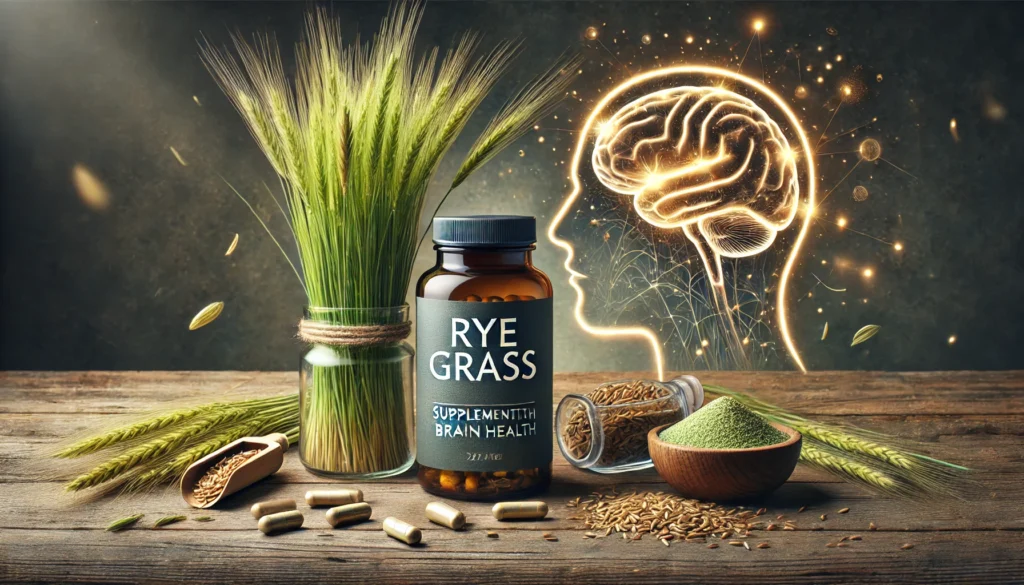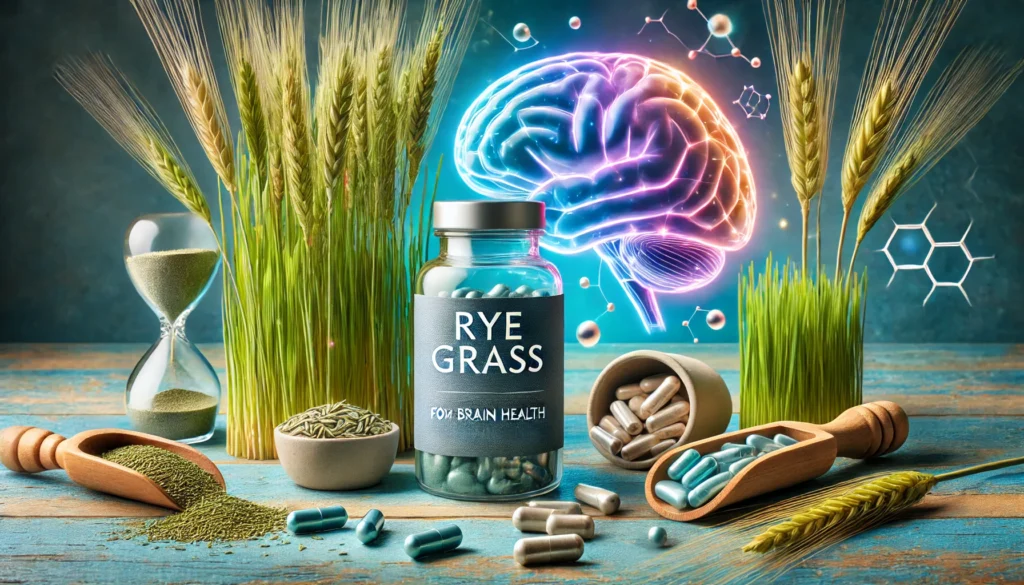Rye grass (Lolium perenne), typically associated with its agricultural and ecological roles as a forage grass and soil stabilizer, has garnered attention as a potential nootropic supplement due to its purported cognitive and neurological benefits. Although rye grass has traditionally been recognized for its use in animal feed and erosion control, recent research suggests that it may possess compounds that promote brain health and enhance cognitive function. This article explores the chemistry, physiological mechanisms, potential nootropic benefits, recommended dosages, side effects, interactions with other supplements and medications, and potential risks associated with rye grass supplementation.
You May Also Like:
Rye Grass: Potential Nootropic Benefits, Dosage, Side Effects, Interactions and Other Important Information About This Supplement is an original (NootropicsPlanet) article.
Sources of Rye Grass
Rye grass is a type of perennial grass native to Europe, Asia, and North Africa but is now grown worldwide. It is typically used as a cover crop, lawn grass, and pasture grass for livestock. The components of rye grass that are most frequently highlighted in the context of human health and supplementation are its extracts and derivatives, which are rich in bioactive compounds such as flavonoids, lignans, alkaloids, and phytoestrogens.
While rye grass itself is not commonly consumed directly by humans, extracts derived from it are available in various forms, including powders, capsules, and liquid tinctures. These supplements are often marketed for their potential to support cognitive function, hormone regulation, and general well-being.

Chemistry of Rye Grass
Rye grass contains several biologically active compounds that may account for its potential nootropic effects. The most notable of these include flavonoids and phytoestrogens. Flavonoids, which are plant-based polyphenols, are known for their antioxidant and anti-inflammatory properties. In the context of rye grass, flavonoids may play a role in reducing oxidative stress in the brain, which is implicated in cognitive decline and neurodegenerative diseases.
Another key component is lignans, which are phytoestrogens—plant-derived compounds with estrogen-like activity. Lignans have been studied for their neuroprotective properties, with some research suggesting they may modulate neurotransmitter systems and protect neurons from oxidative damage.
Additionally, rye grass contains alkaloids, which are nitrogen-containing compounds that can affect neurological activity. These compounds, although present in lower concentrations, may contribute to the plant’s overall effects on mood regulation and cognitive performance.
Physiological Mechanisms of Rye Grass in the Body and Brain
The potential nootropic benefits of rye grass are primarily linked to its antioxidant, anti-inflammatory, and neuroprotective effects. Oxidative stress, which occurs when there is an imbalance between free radicals and antioxidants in the body, is a significant contributor to age-related cognitive decline and neurodegenerative disorders like Alzheimer’s disease. Rye grass, through its flavonoid content, may help neutralize reactive oxygen species (ROS), reducing the oxidative damage that affects brain cells over time.
Furthermore, the phytoestrogens in rye grass may have a modulatory effect on the brain’s hormonal balance. Estrogen is known to influence cognitive function, particularly memory and mood. Phytoestrogens can bind to estrogen receptors in the brain, mimicking some of estrogen’s beneficial effects on neuroprotection and neurotransmitter regulation. This action may be particularly relevant for post-menopausal women, who experience a natural decline in estrogen levels that can affect cognitive health.
Rye grass may also influence the brain’s dopaminergic and serotonergic systems. Both dopamine and serotonin are critical neurotransmitters involved in mood regulation, reward, motivation, and cognition. By modulating these systems, rye grass extracts may help enhance mood, alleviate symptoms of anxiety and depression, and improve cognitive focus.
Unlock Brain Health and Mental Resilience with Advanced Bacopa Monnieri—Shop Now on Amazon!

Nootropic Benefits of Rye Grass
The potential cognitive benefits of rye grass, though not as well-researched as more established nootropics like caffeine or L-theanine, offer a promising avenue for exploration. The primary nootropic benefits of rye grass supplementation include:
- Antioxidant Properties and Brain Protection: Rye grass contains antioxidants that help neutralize free radicals and reduce oxidative stress in the brain. Oxidative stress is linked to cognitive decline, neurodegenerative diseases, and general brain aging. By protecting neurons from oxidative damage, rye grass may contribute to long-term brain health and cognitive preservation.
- Anti-Inflammatory Effects: Inflammation in the brain has been associated with several cognitive impairments and neurological disorders. The anti-inflammatory compounds in rye grass, such as polyphenols and flavonoids, may help reduce neuroinflammation, potentially leading to enhanced cognitive function, better memory retention, and improved focus.
- Improved Blood Flow and Oxygenation: Certain nutrients in rye grass, particularly chlorophyll, may help improve circulation by increasing oxygen supply to the brain. This enhanced blood flow can result in sharper focus, mental clarity, and a reduction in mental fatigue, especially during tasks requiring sustained attention.
- Mood Enhancement: Rye grass supplements may have mood-boosting effects due to their ability to support the production of neurotransmitters, such as serotonin and dopamine. These neurotransmitters are vital for mood regulation, emotional balance, and overall mental well-being, indirectly supporting cognitive functions like motivation, concentration, and emotional resilience.
While rye grass offers promising nootropic benefits, further research is necessary to establish its full cognitive potential. Its current appeal lies in its natural antioxidant and anti-inflammatory properties, which support brain health and function.

Dosage and Supplementation Guidelines
There is no standardized dosage for rye grass as a nootropic, given the limited amount of research focused specifically on its cognitive benefits. However, based on available data, general guidelines suggest starting with a low dose and gradually increasing to find the optimal amount for cognitive enhancement and general health benefits.
- General Cognitive Enhancement: A typical dosage of rye grass extract is between 200-500 mg per day. It is advisable to start at the lower end of this range and assess tolerance and effects before increasing the dose.
- Forms of Supplementation: Rye grass is available in various forms, including powdered extracts, capsules, and liquid tinctures. Capsules and tinctures offer the most convenience and consistent dosing, while powders can be added to smoothies or other beverages.
- Long-Term Use: As with most supplements, it is recommended to cycle rye grass supplementation, such as using it for 4-6 weeks followed by a 1-2 week break. This helps prevent tolerance build-up and ensures continued efficacy.
Side Effects and Safety
Rye grass is generally considered safe when taken in moderate amounts. However, there are potential side effects that should be considered, particularly in individuals with certain health conditions or those taking other medications.
- Gastrointestinal Distress: Some individuals may experience mild gastrointestinal symptoms, such as nausea or stomach discomfort, particularly when taking high doses of rye grass extract.
- Allergic Reactions: Rye grass is a common allergen for individuals with grass pollen allergies. If you are allergic to grass, rye grass supplements may trigger allergic reactions such as nasal congestion, hives, or asthma-like symptoms.
- Hormonal Effects: Due to the phytoestrogen content in rye grass, individuals with hormone-sensitive conditions (such as breast cancer, uterine fibroids, or endometriosis) should avoid supplementation unless directed by a healthcare provider.
- Interaction with Medications: Rye grass supplements may interact with medications that affect hormone levels, such as birth control pills or hormone replacement therapy. It may also affect the metabolism of drugs that rely on the liver for detoxification.

Interactions with Other Supplements and Medications
As with any supplement, rye grass may interact with other medications or supplements, potentially altering their effects or causing adverse reactions.
- Blood Thinners: Rye grass may have mild anticoagulant effects due to its phytoestrogen content. This can increase the risk of bleeding when combined with blood-thinning medications such as warfarin or aspirin.
- Hormonal Medications: As mentioned earlier, rye grass’s phytoestrogens can interact with medications that affect hormone levels. This includes not only birth control and hormone replacement therapy but also medications for conditions like prostate cancer, which often involve hormone regulation.
- Other Nootropics: When combined with other nootropics such as caffeine, L-theanine, or racetams, rye grass may enhance cognitive effects, but this can also increase the risk of overstimulation, headaches, or jitteriness. It is recommended to start with low doses when stacking nootropics.
- Antidepressants: Rye grass may interact with SSRIs (selective serotonin reuptake inhibitors) or other antidepressants by influencing serotonin levels. This interaction could either enhance or interfere with the medication’s effects, so consultation with a healthcare provider is essential.
Risks for Individuals with Certain Health Conditions
While rye grass is safe for most individuals, certain health conditions may require caution when using this supplement.
- Grass Allergies: Individuals with known allergies to grasses should avoid rye grass supplements, as allergic reactions can range from mild to severe.
- Hormone-Sensitive Conditions: Because rye grass contains phytoestrogens, individuals with hormone-sensitive conditions should consult a healthcare provider before use. This includes individuals with breast cancer, uterine cancer, or other conditions influenced by estrogen levels.
- Liver Disease: Those with compromised liver function should use rye grass with caution, as it may affect the liver’s ability to metabolize other compounds.
Conclusion: Should You Consider Rye Grass as a Nootropic?
Rye grass offers potential nootropic benefits through its antioxidant, neuroprotective, and mood-enhancing properties. While not as widely studied as other nootropics, the bioactive compounds in rye grass—such as flavonoids, lignans, and alkaloids—suggest that it could play a role in promoting brain health, improving mood, and supporting cognitive clarity. However, given the limited amount of human clinical data, individuals should approach rye grass supplementation cautiously and consult with a healthcare provider, particularly if they have underlying health conditions or are taking other medications.

References:
- Rye Grass – Uses, Side Effects, and More. Retrieved from: https://www.webmd.com/vitamins/ai/ingredientmono-466/rye-grass
- Neuroprotective Effect of Antioxidants in the Brain. Retrieved from: https://pmc.ncbi.nlm.nih.gov/articles/PMC7582347/
- The development of cognitive flexibility and its implications for mental health disorders. Retrieved from: https://pmc.ncbi.nlm.nih.gov/articles/PMC11496217/
- Synaptic Plasticity, Neurogenesis, and Functional Recovery after Spinal Cord Injury. Retrieved from: https://pmc.ncbi.nlm.nih.gov/articles/PMC2897707/
Important Note: The information contained in this article is for general informational purposes only, and should not be construed as health or medical advice, nor is it intended to diagnose, prevent, treat, or cure any disease or health condition. Before embarking on any diet, fitness regimen, or program of nutritional supplementation, it is advisable to consult your healthcare professional in order to determine its safety and probable efficacy in terms of your individual state of health.
Regarding Nutritional Supplements Or Other Non-Prescription Health Products: If any nutritional supplements or other non-prescription health products are mentioned in the foregoing article, any claims or statements made about them have not been evaluated by the U.S. Food and Drug Administration, and such nutritional supplements or other health products are not intended to diagnose, treat, cure, or prevent any disease.


